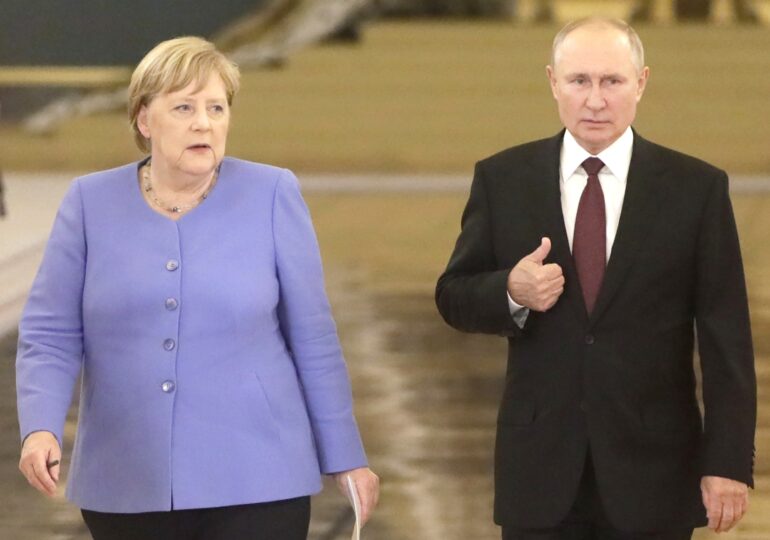During a recent visit to Hungary to promote her memoir, titled „Freedom,” former German Chancellor Angela Merkel suggested that the invasion of Ukraine by Russia could have been avoided.
„If it weren’t for the Covid pandemic, if Eastern European leaders hadn’t refused at least once to engage in discussions with Vladimir Putin, the Russian president might not have ordered the invasion,” Merkel said.
Coming at a time when Europe is struggling to counter the escalating aggression of Russia, Merkel's comments highlight how she dismisses strong criticism - especially from Eastern Europe - regarding Germany's historical failure to understand the threat posed by Moscow, writes Politico.
Leaders from the countries most exposed to Moscow accuse her of turning a blind eye to Putin's challenges, pursuing an economic rapprochement strategy that failed in 2022 when Russian tanks once again entered Ukraine.
Notably absent from Merkel's comments was a critical analysis of what many consider to be her own decisive failures in Germany's relations with Putin during her 16-year tenure.
Instead, Merkel suggested that an agreement could have been reached with Putin if Europeans had a little more luck and determination.
"Would Putin have invaded Ukraine if it weren't for the Covid pandemic?" Merkel asked during an interview with a Hungarian journalist.
"No one can say for sure," she added, echoing an argument she also supports in her book: "If you can't meet face to face, if you can't resolve differences of opinion face to face, then you can't find compromises."
Merkel continued to suggest that the reluctance of Eastern European countries - namely the Baltic states and Poland - to agree to negotiate with Putin in 2021, when she and French President Emmanuel Macron raised the possibility of a high-level meeting between European leaders and the Russian president, could have also contributed to the invasion.
"It didn't materialize, then I left office, and then Putin's aggression began," Merkel said about the proposal for this summit.
Merkel's comments have outraged Ukrainian and Eastern European leaders, who long before Russia's invasion repeatedly warned Germany about Putin's aggressive intentions and imperial ambitions, although this message went unheard.
A senior Ukrainian official told Politico that Merkel's current comments are "unacceptable and sick."
On the other hand, Putin's propagandists and pro-Kremlin media have largely welcomed them. The former chancellor's comments fit perfectly into the Kremlin's narrative that the West is the real aggressor.
"Merkel acknowledged what was obvious: the West provoked the Ukrainian conflict," read a pro-Kremlin Russian tabloid headline.
The Fall from Grace
Merkel's reluctance to consider harsh criticisms of her country's policy towards Russia reveals how deeply rooted some old attitudes of Germany towards Moscow remain.
During Merkel's 16-year tenure, Germany's policy towards Russia was defined by the slogan "Wandel durch Handel" or "change through trade."
Economic interdependence with Russia was believed to contribute to ensuring peace in Europe, while being very beneficial for German businesses at the same time.
A key manifestation of this policy was the Nord Stream pipelines, built to bring Russian gas directly to Germany through the Baltic Sea. In 2014, even after Russia sent "little green men" to certain parts of Ukraine and annexed Crimea, German officials supported the plan to create a second such pipeline (the first was completed in 2011).
They did this despite warnings from Eastern European leaders that Germany was pursuing a conciliatory policy in the face of increasingly evident Russian imperialism.
After Russia's large-scale invasion in 2022, many German leaders admitted that their approach to Russia had been a failure and that the purchase of cheap Russian gas had greatly contributed to funding Putin's war machine.
However, it seems too difficult for Merkel - once praised as the "chancellor of the free world," when Time magazine named her "Person of the Year" in 2015 - to accept that history may judge her much more harshly.
"I think we have a growing problem here with Merkel losing touch with reality, as I would describe it, and trying to influence her own history, her own role in history," said Stefan Meister from the German Council on Foreign Relations.
"In my opinion, this makes her unworthy of trust. She discredits herself," he said.
Within Germany - and especially in former East Germany, where Merkel grew up - there is still considerable sympathy for Putin. Parties like the far-right Alternative for Germany, currently leading in many polls, and the leftist populist Alliance led by Sahra Wagenknecht take a much more conciliatory approach towards Moscow.
Some pro-Russia forces in Germany are seizing on Merkel's interview to blame NATO for sabotaging peace efforts.

